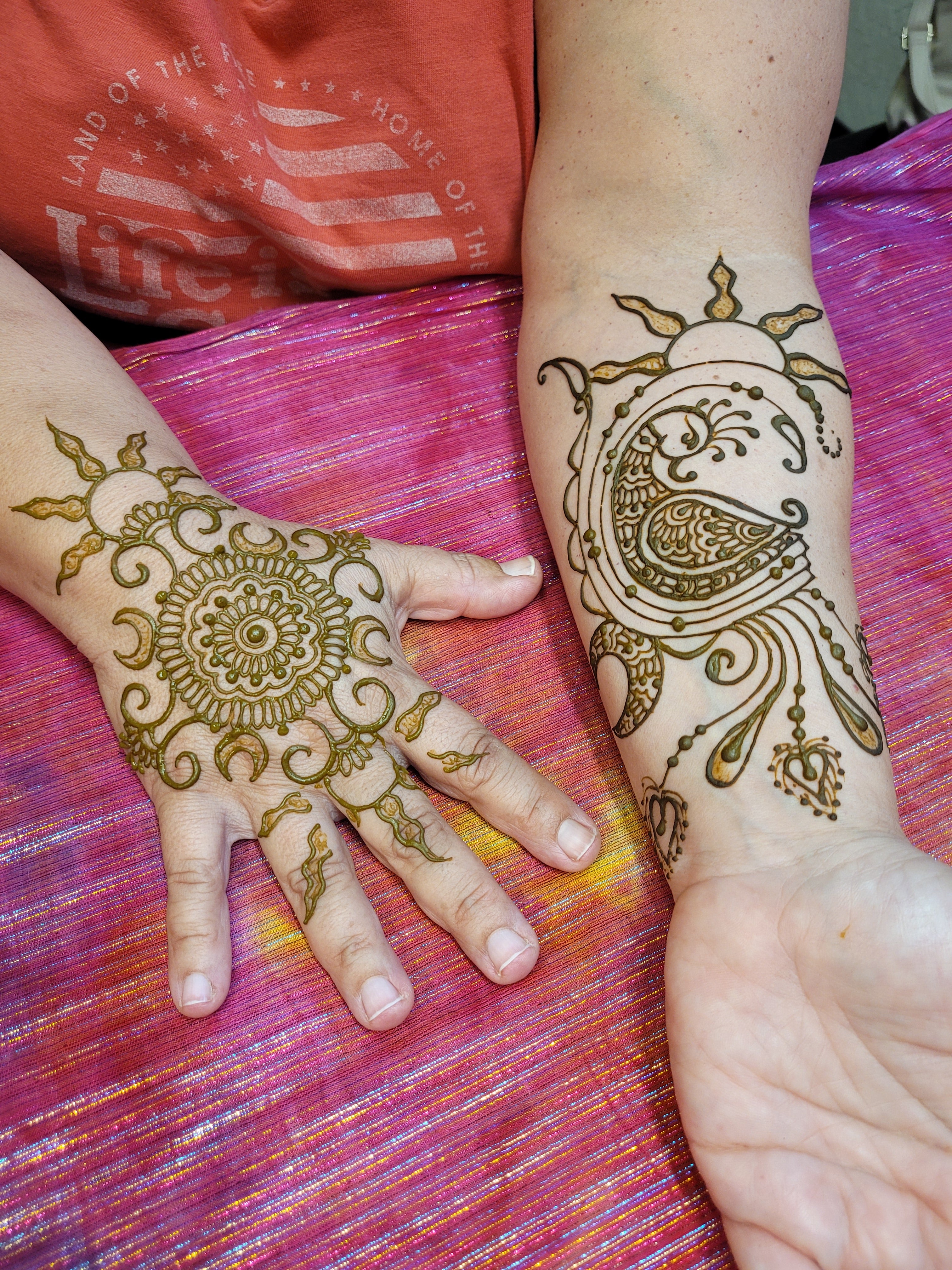Troubleshooting: Henna stain is fading quickly.
Henna is a permanent stain. While the henna itself doesn't fade, it's the natural exfoliation of the skin cells that causes the henna design to gradually fade away. To get good long lasting stain we need to ensure many layers of skin are stained, and that they are not exfoliated away.
-
Ensure Clean Dry Skin:
- Residue from lotions, sweat, or hair products can create a barrier, resulting in a lighter stain. Cleanse the skin thoroughly before applying henna using soap, water, and/or rubbing alcohol. Note that self-tanner and deep moisturizers/body butters can also affect the stain causing it to be substantially lighter.
- Residue from lotions, sweat, or hair products can create a barrier, resulting in a lighter stain. Cleanse the skin thoroughly before applying henna using soap, water, and/or rubbing alcohol. Note that self-tanner and deep moisturizers/body butters can also affect the stain causing it to be substantially lighter.
-
Increase Duration of Paste on the Skin:
- For optimal color longevity, leave the henna paste on for at least four hours. Longer application times result in deeper, longer-lasting stains. Henna left on for only an hour will fade quickly.
The longer henna paste is on the skin, the more layers of skin are actually stained. As top layers exfoliate away, you still have layers of stained skin.
- For optimal color longevity, leave the henna paste on for at least four hours. Longer application times result in deeper, longer-lasting stains. Henna left on for only an hour will fade quickly.
-
Protect from Water and Chemicals:
- Excessive exposure to water, especially chlorinated or salt water, accelerates henna fading. Apply a light layer of olive or coconut oil before water contact, and consider using spray bandage sealer if swimming.
- Excessive exposure to water, especially chlorinated or salt water, accelerates henna fading. Apply a light layer of olive or coconut oil before water contact, and consider using spray bandage sealer if swimming.
-
Avoid Exfoliating Products:
- Many facial soaps, lotions, and hair products can hasten henna fading due to their exfoliating properties. Be mindful of the products you use on hennaed skin (even indirectly).
- Many facial soaps, lotions, and hair products can hasten henna fading due to their exfoliating properties. Be mindful of the products you use on hennaed skin (even indirectly).
-
Minimize Rubbing/Exfoliation:
- Choose body areas less prone to rubbing for henna application to prevent premature fading. For instance, avoid wrist areas with watch straps or areas of the feet where sandals or shoes rub.
- Choose body areas less prone to rubbing for henna application to prevent premature fading. For instance, avoid wrist areas with watch straps or areas of the feet where sandals or shoes rub.
-
Moisturize Dry Skin:
- Dry skin promotes henna absorption but also accelerates fading as it sheds cells faster. Once paste is removed and you have a henna stain, keep it moisturized. Apply olive oil, coconut oil, or non-exfoliating lotion daily to maintain moisture and prolong the henna stain.
- Dry skin promotes henna absorption but also accelerates fading as it sheds cells faster. Once paste is removed and you have a henna stain, keep it moisturized. Apply olive oil, coconut oil, or non-exfoliating lotion daily to maintain moisture and prolong the henna stain.
-
Consider Skin Exfoliation Rate:
- Different body parts exfoliate at varying rates, affecting henna stain longevity. While hands stain dark, they fade faster than the upper arm due to quicker exfoliation.
- Different body parts exfoliate at varying rates, affecting henna stain longevity. While hands stain dark, they fade faster than the upper arm due to quicker exfoliation.
-
Do Not Exfoliate Directly Before Henna Application:
- Old dry skin cells take henna really well. Fresh skin cells do not take henna well because they retain more moisture. You want to do henna on clean dry skin, but not freshly exfoliated skin.

Henna is for Everyone!
We all deserve to feel beautiful and powerful!
